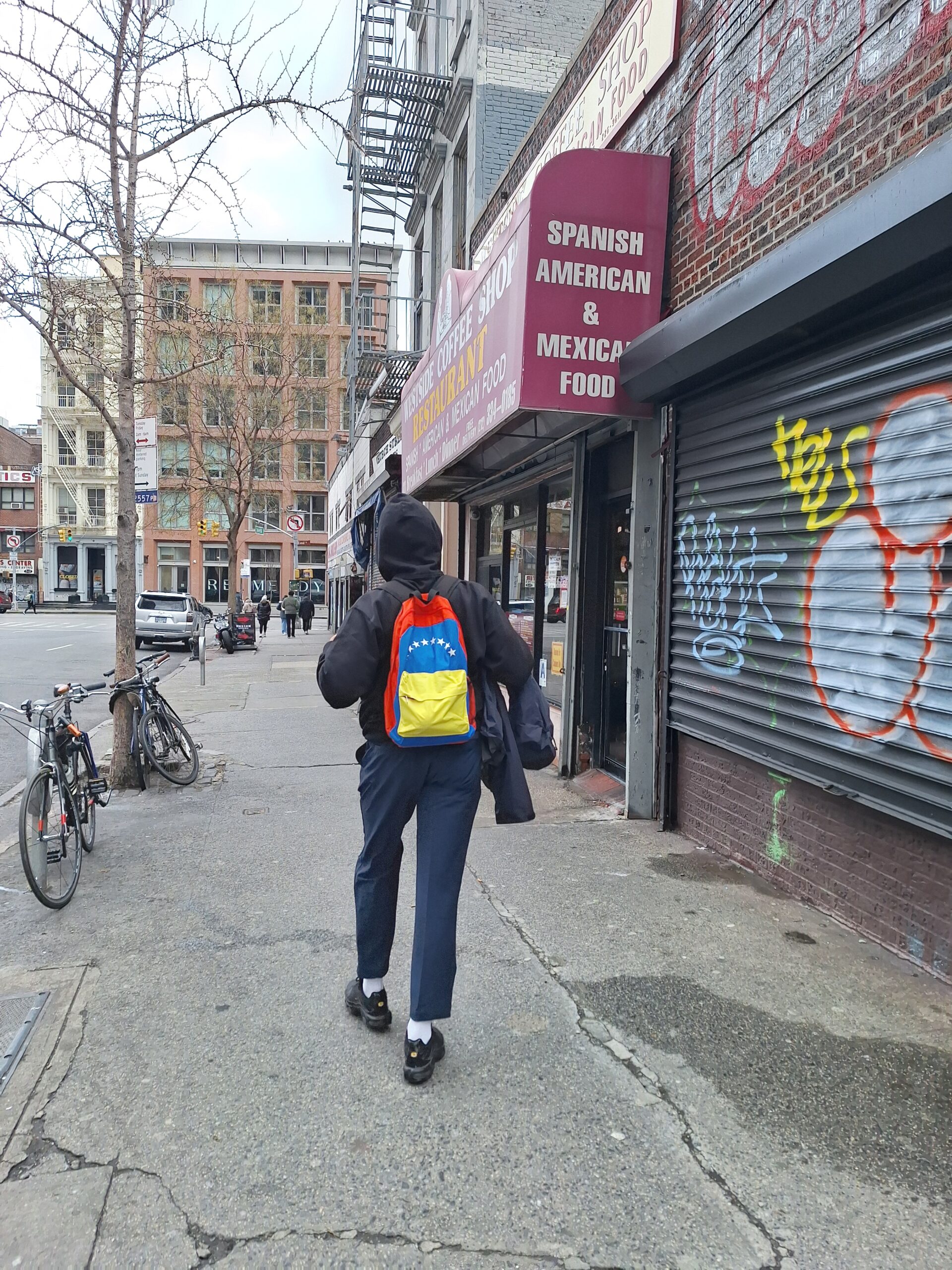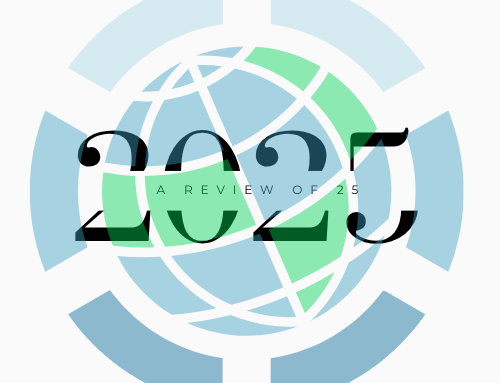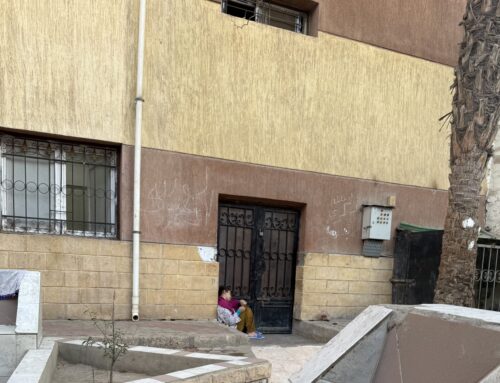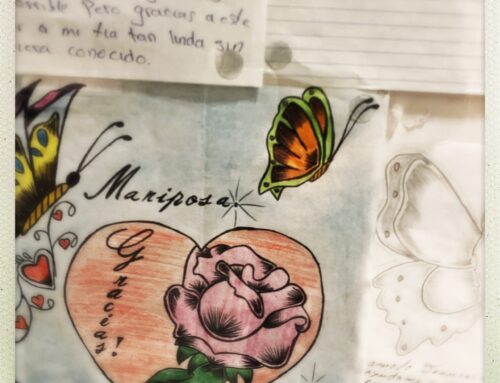
A Venezuelan immigrant walks in the streets of New York City. Photo by Erick Moreno Superlano.
In the early 2000s, Andrés, a middle-class Venezuelan university student, watched a pro-government rally in Caracas that left him shaken. “Orcos,” he later recalled in an interview with me, evoking Tolkien’s monstrous hordes to describe poor Venezuelans mobilizing under Hugo Chávez. Andrés, now a business owner in the US, told me it became clear at that moment that he had to leave the country. For him, this demonstration signaled more than political change. It threatened a social order that had long sustained his class position. The Chavista revolution wasn’t simply redistributing resources. It was redrawing the moral and spatial boundaries of Venezuela’s socio-political landscape, allowing the poor to claim urban space, economic opportunity, and the national narratives around citizenship.
Andrés is not alone in fearing the “orcos” descending from the peripheries of Caracas and invading middle-class urban centers, in Venezuela and abroad. Many upper-middle class Venezuelans in the US I have interviewed claim they left the country because of it—and they still feel this threat of lower-class invasion, even outside of the country.
The collective anxiety around the invader is rooted in Venezuela’s deep class and racial inequalities (Lander 2005). Before Chávez’s (now-failed) socialist revolution, the state tried to contain the poor at the peripheries until they internalized middle-class values and proved to be morally fit to participate in urban, modern life. This is a fear rooted in racial and spatial boundaries.
That anxiety around the figure of the invader is being reterritorialized in the US. Global mobility regimes (Salazar and Glick-Schiller 2014) had historically reserved access to America for wealthy Venezuelans while containing working-class mobility to the Global South. In line with this trend, the 2021 Temporary Protected Status (TPS) for Venezuelans was initially conceived by Republicans as a measure to protect the established, wealthier Venezuelan community in the U.S. By shielding recipients from deportation and granting 18 months of work authorization, however, TPS inadvertently created an unprecedented legal pathway that poorer Venezuelans were able to leverage to enter and remain in the country. (Previously, entering the US required a passport, a visa, and proof of sufficient funds, barriers that excluded most working-class Venezuelans.)
The introduction of TPS for Venezuelans coincided with post-COVID19 economic stagnation and rising xenophobia in Latin America. Many working-class Venezuelans seized the chance to migrate overland to the US. Their arrival in America was perceived by many middle- and upper-class Venezuelans as another orc invasion, threatening their lifestyle, moral values, and social respectability. The urge to resuscitate pre-Chávez era containment logics around moral maturity seems to be emerging in the US to protect the middle-class exile space (Landau 2024).
Precriminalizing immigrants
Images of poor Venezuelans crossing the Darién to reach the US triggered old fears of invasion and reanimated middle-class moral imaginations. Many middle-class Venezuelans I interviewed in Miami support Trump’s anti-immigration policies because they also view their working-class co-nationals as dangerous invaders. They associate them with the violence and moral corruption of Chávez’s mobs. Seeing the poor penetrate a space long considered to be reserved for the middle-class, they have leveraged their political connections, particularly with influential figures like Secretary of State Marco Rubio, to advocate for more restrictive immigration policies.
In a speech on the Senate floor where he addressed immigration as a national security threat, Rubio (2024) said:
For a year now, the Venezuelan community in South Florida has been telling me to be careful, because some of the people that are coming from Venezuela now are clearly gang bangers. They were right… You think you can release 600,000 people with criminal histories, and they’re all of a sudden all going to become entrepreneurs and start some tech company? No, the chances are that a lot of them are going to continue to be criminals. You’re going to have a crime wave. It’s already starting. No part of this country will be immune from it.
The fear of the poor Venezuelan invader has been amplified by the Tren de Aragua criminal organization, associated with Venezuela’s rogue government, that American authorities and media have portrayed as a major national security threat. The designation of Tren de Aragua as a terrorist organization by the Trump Administration served as legal infrastructure to pre-criminalize Venezuelan asylum seekers and contain them at the first-world periphery.
This alignment of elite diaspora anxieties with institutional policy responses has reterritorialized pre-Chávez moral geographies among Venezuelans in the US. Reverberations of stigmatizing narratives from back home moralize harsh externalization measures at the border among many Venezuelans. These measures precriminalize Venezuelan immigrants and justify extending border controls beyond national territory to contain the mobility of those deemed dangerous (Cobarrubias and Novak 2024). One of my interlocutors in Miami told me that, “hay que limpiar la casa, y los EEUU está en todo su derecho de hacerlo” (It is time to clean the house, and the US is fully within its rights to do so).
Gatekeeping America’s Moral Geography
In this moral economy (Stielike et al. 2025), middle-class Venezuelans in America position themselves as symbolically reinforcing border externalization by re-inscribing Venezuela’s moral geography in the middle class’s exile cartography. For them, the pre-criminalization and deportation of poor Venezuelans might be harsh, but necessary to protect their reputation as exceptional migrants. Decades of petrodollar wealth and anti-communist exile narratives enabled them to craft a desirable identity compatible with conservative views of America. These Venezuelans see themselves as educated, freedom-fighters, entrepreneurial, and racially legible as white and cosmopolitan. This cultivated identity hedges against American racial hierarchies that often cast Latin Americans as cheap labor and racial others. However, by aligning with American anxieties about security and moral order, they reinforce the bordering practices they fear.
Despite years of cultivating political ties with the Republican Party and supporting its restrictive immigration policies, Florida’s middle-class Venezuelans have lost the unconditional support of Rubio. He recently urged Homeland Security Secretary Kristi Noem to terminate Temporary Protected Status (TPS) for Venezuelans, arguing that members of this population pose a threat to national security. This reversal has left the entire Venezuelan community vulnerable regardless of their socioeconomic background.
The containment efforts championed by the middle class have backfired as the Trump administration accelerates deportations for thousands of Venezuelans. The administration is signaling that the Venezuelan community, including its moral reinforcers of border externalization, might be perceived as unfit (Schrag 2010) for America’s moral geographies after all. By reinforcing the bordering practices to protect themselves, Venezuelan middle-class migrants show that America’s racial hierarchies cannot be bypassed. They can only be reproduced through participation in the subordination and deportability they try to escape.
References
Cobarrubias, Sebastian, and Paolo Novak. 2024. “Embedding Externalisation: How Bordering Practices Transform Places.” Geopolitics 30 (1): 1–18.
Lander, Edgardo. 2005. “Venezuelan Social Conflict in a Global Context.” Latin American Perspectives 32 (2): 20–38.
Salazar, Noel B., and Nina Glick Schiller, eds. 2014. Regimes of Mobility: Imaginaries and Relationalities of Power. Routledge, Taylor & Francis Group.
Schrag, Peter. 2010. Not Fit for Our Society: Immigration and Nativism in America. University of California Press.
Stielike, Lisa, Ines Löhr, Christian Reinecke, Patrick Schäfer, and Inken Bartels. 2025. “Rethinking the Production of Knowledge on Migration: A Moral Economies Approach.” Journal of Ethnic and Migration Studies 51 (10): 2505–2528.
Erick Moreno Superlano is a Ph.D. candidate in Migration Studies at the University of Oxford, and a Visiting Scholar at the Zolberg Institute on Migration and Mobility at The New School.
Cite as: Moreno Superlano, Erick. 2025. “Reterritorializing Venezuela’s Moral Geography in the US”. In “Bordering and the War on Migration”, edited by Anna Simone Reumert, Wendy Vogt, and Charlie Piot, American Ethnologist website, 23 September 2025. [https://americanethnologist.org/online-content/reterritorializing-venezuelas-moral-geography-in-the-us-by-erick-moreno-superlano/]
This piece was edited by American Ethnological Society Digital Content Editor Kathryn E. Goldfarb (kathryn.goldfarb@colorado.edu).




